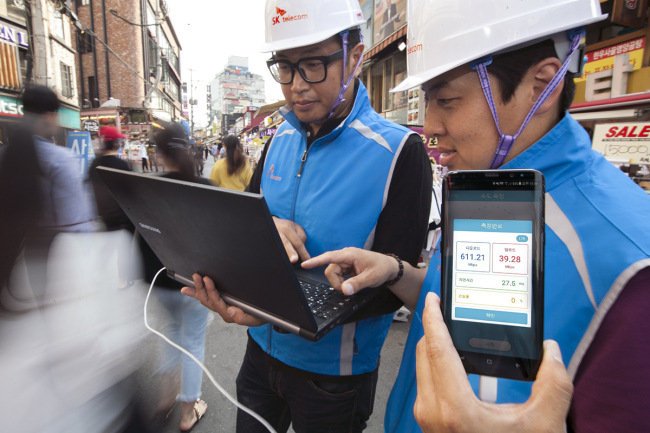South Korean chipmakers and mobile carriers are enjoying early rallies in their stocks due to high market expectations of an industrial shift toward future technologies.
And the biggest beneficiary of the industrial shift, so-called the fourth industrial revolution will be Samsung, analysts said Sunday.
Financial analysts noted stock prices of domestic semiconductor, display and telecommunication-related firms are rising rapidly.
This year alone, IT market bellwether Samsung Electronics soared 27.5 percent as of Friday from the last trading day of 2016. LG Electronics showed a whopping 67.8 percent surge during the same period.
“Korea’s leading IT shares are sharply rising as they are influenced by tech shares in the US market,” said Lee Soo-jeong, an analyst at Meritz Securities in a recent report. “The rallies are likely to expand across hardware makers, software makers then biotech firms in order.”
In the report, hardware manufacturers refers to chipmakers and their parts suppliers, while software firms include internet firms and mobile carriers.
They also forecast Samsung’s market leadership to continue in the long run.
“When the fourth industrial revolution really unfolds, three-dimensional NAND memory chips will be enormously important in enhancing artificial intelligence and Internet of Things technologies,” said Jeong Heui-seok, an analyst at Korea Investment & Securities.
Indeed, May growth in the country’s total exports was largely led by chipmakers.
Monthly exports jumped 13.4 percent to $45 billion last month, due to a 63.3 percent increase in semiconductor exports, data from the Ministry of Trade, Industry and Energy showed.
“Korean mobile carriers will also take advantage of the industrial change which requires commercialization of the fifth generation network,” Jeong continued, “Korean telecom firms will have opportunities in the 5G market ahead of others as they are actively preparing for 5G services at the PyeongChang Winter Olympics.”
Ahead of commercialization of the 5G network in 2019, SK Telecom, the country’s largest mobile carrier by the number of subscribers, said Sunday it launched the 4.5G network service, which will provide the fastest speed of 900 Mbps in six major cities including Seoul and Busan, and 700 Mbps nationwide. Downloading a 2-gigabyte movie takes 23 seconds at 700 Mbps, which is about 40 percent faster than using the current 4G network.
 |
SK Telecom employees test the data transfer speed of the 4.5G network in a neighborhood nearby Hongik University in Seoul. (SK Telecom) |
With the latest 4.5G network, SKT will be able to introduce immersive media content in the form of virtual reality and 3-D hologram, which consume massive data, earlier than its competitors, the company said.
“5G commercialization will serve as a long-running momentum for growth of the entire telecom industry,” said Yang Jong-in, another analyst at Korea Investment & Securities.
The mobile carriers are also taking the lead in the IoT market, attracting an increasing number of subscribers to home IoT services.
In April alone, the total of number of subscribers to IoT services by SK Telecom, KT and LG Uplus rose 26.5 percent from a year earlier to 5.85 million, Yang said.
“KT and LG Uplus are focusing efforts on the IoT sector, which will help them expand the market leadership,” he added.
LG Uplus’ shares surged about 40 percent on its moves toward the IoT market for the period between January and early June. While SKT’s stock value rose about 18 percent, KT had a 9 percent rise during the same period.
By Song Su-hyun (
song@heraldcorp.com)








![[From the Scene] At this Starbucks, you need ID: Franchise opens store with view of North Korea](http://res.heraldm.com/phpwas/restmb_idxmake.php?idx=644&simg=/content/image/2024/11/29/20241129050068_0.jpg)